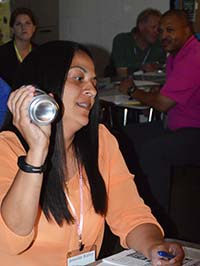Crestwood Middle School psychologist Kathy Lennon was feeling surly. She was not about to listen to social worker Cathy DeHaan lead a session at the EKConference 2015.
Lennon sat at her desk and picked loudly at the cardboard on her coffee cup. “How are you doing?” DeHaan asked as she approached Lennon to see what the problem was.
“Fine!” Lennon said.

“It looks like maybe you’re stressed out,” DeHaan said.
“It looks like maybe you’re stressed out, and you’ve got a class to teach so you might as well teach it!” answered Lennon.
The professionals were reenacting how a student escalates into defensiveness, and how best to respond to their behavior in the workshop titled, “Mental Health Issues in School and Verbal De-Escalation.” It focused on how a student’s mental health impacts success in school, touching on depression, anxiety, marijuana use and related behaviors.
Playing To Their Strengths
The EKConference allowed DeHaan to share her knowledge with other East Kentwood High School and Crestwood Middle School teachers. Educators chose from 74 workshops spread over five sessions.
Co-created last year by teachers and academic coaches Luke Wilcox and Tracey Kooy, the purpose of the conference is for staff members to tap into one another’s knowledge. Sharing expertise ultimately leads to better teaching, they said, and educators are carrying what they learn into the classroom.
“It’s great for the teachers because we are learning from each other and we are able to hear from different areas of specialty,” Lennon said. “There are so many different subjects to hear about.”

Throughout the day, educators covered topics on technology, art, history, writing, leadership, special education, reading, test preparation, speech, fundraising, math, science, teaching, English-language learners and new teaching approaches.
Workshops were as diverse as exploring ways to use GoFit heart sensors in physical education, and how teenagers use American music and pop culture to establish voice, identity, craft and civic responsibility.
The goal is to give teachers a place where they can easily collaborate, follow up and feel comfortable doing so, said Kooy, an English teacher who has been involved in a research project with the University of Toronto for three years based on professional development needs. Traditional professional development sessions are led by visitors on a one-time basis.
“When teachers can choose their learning, they are more invested,” Kooy said. It’s not everyone learning the same thing, because that marginalizes learning and it doesn’t allow us to seek out where we have a weakness. If we can visit sessions where we feel we can learn the most, it’s empowering.”
CONNECT









